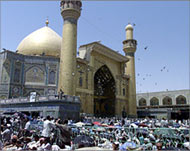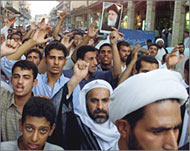Al-Hakim: Walking a political tightrope
Ayat Allah Muhammad Baqir al-Hakim was forced to walk a political tightrope after returning to Iraq after 20 years in exile.

Killed in a bomb attack in Najaf on Friday, he was one of the most influential Shia Muslim figures in Iraq.
Al-Hakim, 64, headed the Supreme Assembly for Islamic Revolution in Iraq (SAIRI).
He returned home to a tumultuous welcome in May after being exiled in Iran for two decades.
Enemies
But soon after it became apparent he had as many enemies as he had friends.
Al-Hakim’s supporters say he was the best hope for Shia Muslims who suffered years of suppression under Saddam Hussein.
But others saw him as a threat who would bring Iranian-style Islam to Iraq.
And yet others condemned him for working with American occupation forces in the country.
Religious family
Al-Hakim was born in the holy city of Najaf into one of Iraq’s most influential religious families.
But they soon fell out of favour under Saddam Hussein’s staunchly secular rule.
Five of al-Hakim’s brothers and more than a dozen other relatives were killed during three decades of struggle against the Baath party.
Al-Hakim himself was imprisoned and tortured as an opposition leader in Iraq during the 1970s, and finally fled to Iran in 1980.
 |
|
Friday’s attack on the Imam Ali |
From Iran, his militias conducted
ambushes, sabotage, and assassinations against the Hussein regime.
Occupation
But when he returned to Iraq after the fall of Saddam, thousands of Shias welcomed him back to his birthplace.
The Ayat Allah immediately denounced the US-led occupation forces and demanded they withdraw from Iraq and allow the people to establish an Islamic government.
Addressing a gathering of over 60,000 people in Basra, he told Iraqis they should reject any imposed government.
“We are not slaves, except for slaves of God. We are not prisoners. We are not afraid of the forces that are around us now and watching us,” he said.
“Would the Americans like to be ruled by the British? So how can you expect us to be ruled by the Americans?”
Iraqi council
But despite his words, soon after he decided to cooperate with the military occupiers until an Iraqi government was formed.
His brother, Abd al-Aziz al-Hakim, was appointed as a member of the US-backed Iraqi Governing Council, symbolising the willingness of SAIRI to work with the Americans.
This decision undoubtedly made his family plenty of enemies among those who argue for military struggle against occupation forces.
Meanwhile, al-Hakim had no shortage of enemies among his Shia rivals.
Some conservative Iraqi clerics felt their traditionally quietist style and privileged position in Iraqi society should not be risked by overt political activism.
Rivals
There were also Shia leaders who had carved out their own political constituencies and felt threatened by the return of SAIRI.
 |
|
Iraq’s Shias were repressed by |
Some claimed the group had limited standing inside Iraq because its leadership had been out of the country for so long.
Tragically, the rivalries boiled over into violence.
In April, two prominent Shia clerics were assassinated in Najaf.
Their killings were widely perceived as part of an internal dispute among rival Shia factions.
Saddam Hussein
And a day after Saddam’s overthrow, a mob in Najaf hacked to death a Shia cleric who had returned from exile.
Abdul Majid al-Khoei was killed when a meeting called to reconcile rival groups erupted into a melee at the Shrine of Imam Ali.
However, SAIRI members have blamed Saddam Hussein’s supporters for Friday’s deadly attack.
As soon as he returned to Najaf, there were fears attempts would be made on al-Hakim’s life by remnants of Hussein’s regime.
SAIRI spokesman Hamid al-Bayati said Saddam’s supporters want to create instability in Iraq to prove the country could not function without him.
Courageous
But al-Bayati also castigated the Americans for the Ayat Allah’s death.
He said they were not providing the security in Iraq which is their reponsibility as an occupying force.
For many, Ayat Allah al-Hakim will be remembered as a courageous Shia leader who steadfastly opposed Saddam’s regime.
Some will undoubtedly label him as being politically naive or unprincipled.
But no one can deny the suffering he and his family have endured to represent the interests of Iraq’s Shias.